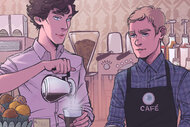Create a free profile to get unlimited access to exclusive videos, sweepstakes, and more!
After and when fanfiction goes mainstream

Amid the big-budget blockbusters that have come to define the modern pop culture landscape, April saw the cinematic release of a true curiosity. After, a romantic drama starring Josephine Langford and Hero Fiennes-Tiffin as two college students who fall into an all-consuming relationship, opened in over 2,000 theaters and made over $6.2 million in its opening weekend. Reviews weren’t kind, and the film was something of an afterthought at the box office given that it came out the same week as Little and Hellboy. People weren’t exactly rushing to talk about it. Yet, as of the writing of this post, Box Office Mojo reports that After has made over $55.8 million worldwide, which is close to four times its initial budget.
However, the fact that the film even exists is a minor miracle because, as you’ll know if you’ve ever been part of a fandom, it shouldn’t exist. After is fanfiction. Not just any fanfiction either. It’s Harry Styles from One Direction fanfiction, originally written on Wattpad. Much like Fifty Shades of Grey before it, After broke out in a big way with its fans, and soon the world of traditional publishing came a-knocking. After and its various sequels charted on the New York Times best-seller list, as Fifty Shades did when it became the pop culture phenomenon of the literary world.
When fanfiction is pulled for publicationIf you’re a fandom resident or fic writer in any capacity, the ways that the entire world of fanfiction has changed, going from our oft-maligned open secret to a legitimate means to become a published author, remain kind of inexplicable. Once upon a time, you would never dare to let anyone know you wrote fanfiction. Now agents prowl Archive of Our Own looking for the next big thing, legality be damned. For some fans, this is the start of a bright new future. For others, it’s the beginning of a slippery slope that could kill the entire world of fandom in its tracks.
When E.L. James’ Fifty Shades of Grey became the inescapable publishing phenomenon of 2012, it was already a growing indie hit and fandom controversy. Everyone knew it was Twilight fanfiction, previously published on FanFiction.net under the title Master of the Universe. It wasn’t as though its original publishers, The Writers’ Coffee Shop, were doing anything to hide that fact, either. Indeed, all of the books they published seemed to have started out as Twilight fanfic. These were books that were readily available to read at one point on fanfiction sites, and all of them were pulled, the recognizable characters’ names changed, and enough edits made to make the work seem “original” so that it could be published as such. After Fifty Shades became a multimillion best-seller and landed a movie deal, the floodgates opened and suddenly it felt like every Twi-fic author was landing six-figure publishing contracts.
The legal and ethical quandaries of this practice (typically referred to as Pulled To Publish, or P2P for short) are deliberately muddy. Fanfiction itself has always operated in the liminal spaces between copyright infringement and freedom of expression. Under U.S. copyright law, the legality of a given work of fanfic is dependent on three legal doctrines: the copyright nature of the source work, the derivative work right, and fair use. To have copyright protection under American law, said work has to be an "original [work] or authorship [...] which can be perceived, reproduced, or otherwise communicated, either directly or with the aid of a machine or device." This includes film, literature, works of theater, music, and so on. You can't copyright an idea or concept, or any other kind of vague principle, so while Twilight is under copyright, the notion of a passionate romance between a human adolescent woman and an immortal vampire is not.
In terms of fanfiction, this is where fair use comes into play. In basic terms, fair use permits people limited use of copyrighted material for their own purposes without the need to get permission from the copyright holder. If you've ever watched a YouTube video essay on a movie that used a lot of footage from said film, it would be argued that what the essayist was doing was harnessing fair use. The limitations of that law are that it is supposed to be used for purposes like commentary, criticism, parody, reporting, research, and so on. Fanfiction is intended to be a transformative process, using the foundations of a copyrighted or original work to explore new avenues of storytelling within a familiar framework. In that aspect, fanfiction could constitute fair use, although as with most examples, if it were to go to court, it would have to be decided on a case-by-case basis. Some authors are more welcoming of fanfiction than others.
Should fanfiction be published?For some people, the fanfiction question of something like Fifty Shades of Grey or After is a hot-button issue in fandom. When you’re part of a community of creative transformative works that already toe the line of copyright issues, not to mention the stigma surrounding fandom that’s especially pernicious when directed at women who participate in it, opening up the doors to this level of public attention feels like unleashing a major secret of some kind.
Fanfic was a hush-hush topic, the thing you did in private then hoped would never be discovered by some talk-show host’s research team looking for a cheap laugh. Everyone in fandom knew the rules: Write what you write and don’t cross the streams into the real world. Don’t tweet links of your fic to the people you’re writing about, don’t ask the showrunners, directors, or individuals related to your fandom to check out your story, and don’t try to profit from it. Basically, don’t do anything that would make the public reputation of fanfiction any worse or more derided than it already is.
Aside from the legal structures, P2P presents creative quandaries too. If you know Twilight well enough then it’s super easy to see the fan-ficcy nature of Fifty Shades. Its structure, its character beats, its emotional pull are all, if not complete replications, clearly cut from the same cloth as Stephenie Meyer’s story. It’s a veritable pick and mix of someone else’s work rearranged in a newer manner by E.L. James. Fanfiction is a rich and fascinating means of creative exploration. Using pre-existing characters and worlds isn’t just a great way to figure out what kind of storyteller you are; it’s a means of understanding those characters and worlds themselves. It's also one of taking new routes and confronting tropes and topics that the source material never did, a chance to take the derivative and challenge oneself. But, the question remains, is there a real challenge to writing your own book if you’re using the foundations of someone else’s work and changing very little or nothing at all?
Why not publish fanfiction?
For others, there’s no real problem to turning one’s fanfiction into original work. After all, fanfic is transformative, and the work of making it something new is already done. Besides, why fight the inevitable when there is clearly a growing market for it? That’s one reason the publishing world has embraced it. Before it shut down in 2018, Amazon's Kindle Worlds was publishing fanfiction for licensed properties like Gossip Girl and The Vampire Diaries, essentially legitimizing the form in a way that emphasized its commercial potential. If your work is good enough and people want to read it, then why not go to publication? You wouldn’t even need to change the names for stuff like that. Fanfiction is an exercise in prompts: Take this world and change that element, or make this character do something they’d never otherwise do, or see what happens when you move this romantic dynamic to a completely different genre or setting. Something like Fifty Shades gets away with what it does because it removes the thing that made Twilight so unique from the equation. After skates by on its derivative nature and the implicit understanding that we all know it’s not the real Harry Styles or how he would act in such circumstances. These are fantasies, prompts, the stuff of speculation, and therein lies the appeal.
It also doesn't hurt that, in terms of fanfiction and fan-ficcy style literary re-imaginings, this is simply part of the medium's history. Writers have been putting their own spin on others' material for literally hundreds of years, possibly even longer, and often to great acclaim and immense influence. Shakespeare's Romeo and Juliet sprang from Ovid's story of Pyramus and Thisbe in The Metamorphosis. March by Geraldine Brooks retold Little Women from the point-of-view of the March family's absent father, and that ended up winning a Pulitzer Prize. Jean Rhys turned the romance of Jane Eyre on its head by giving a voice back to the madwoman in the attic with Wide Sargasso Sea. Madeline Miller's two novels, The Song of Achilles and Circe, are retellings of well-known Greek myths. The list goes on. Many of these stories happen because public domain allows it but there are also plenty of publishers licensing out properties for official sequels or re-imaginings, such as Sophie Hannah's new Poirot stories that follow on from the work of Agatha Christie. The parallels to the world of fandom and fanfiction aren't directly comparable, of course, but it says a lot that such stories are steeped in prestige in a way fanfiction based on romance novels and teen favorites simply aren't.
Pull-to-publish is something that has dramatically changed the landscape of fanfiction in an incredibly short amount of time. It’s coincided with the increasing visibility of fandom, made all the more possible by social media and major studios and corporations’ growing awareness of the benefits of fan loyalty. But fandom is still by and large something that’s seen as niche, especially when compared to the coveted demographics for the biggest pieces of pop culture on the planet. Sure, Star Wars fandom is big, but it’s unlikely and not necessary for every single person who goes to see a Star Wars movie to consider themselves part of that fandom.
So what’s the future for publishing fanfiction? The doors have been opened and it’s unlikely they’ll be closed, or at least they won’t be for some properties. A lot of stuff remains off-limits — Anne Rice will most certainly sue you into oblivion if you try to Fifty Shades her books — but the market is there, publishers are up for it and plenty of fandoms are happy to get involved. Personally, I don’t think I’ll ever warm to the practice. It just feels too ethically sticky for me, not to mention unfair to fandom itself which gets a bad enough rap from people looking for an easy target. I like fanfiction and I like literature, and while the lines between the two were never as distinct as some people would have you believe — hello, the entirety of Western literature and your fan-ficcy glory — I value the experience and structures of fandom and its activities more as their own thing than a publisher’s potential demographic expansion.















